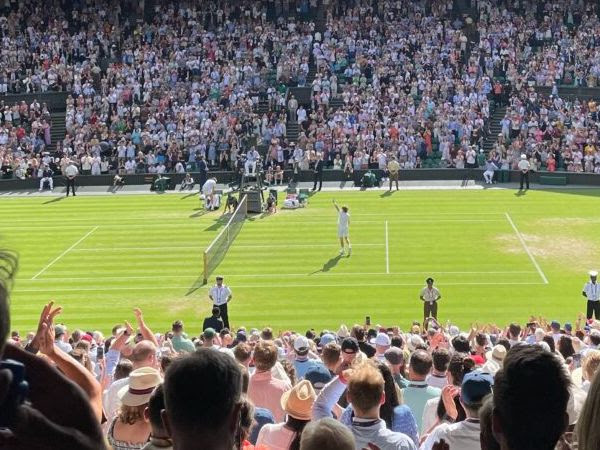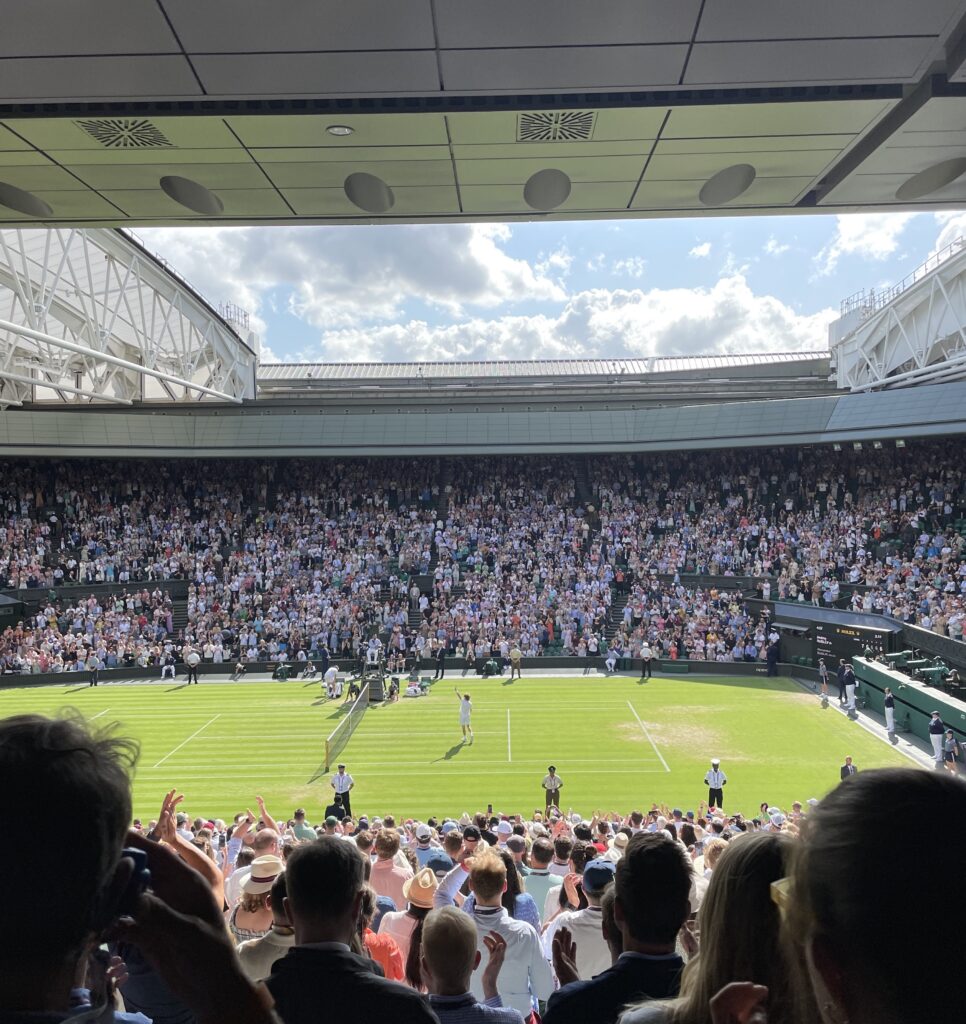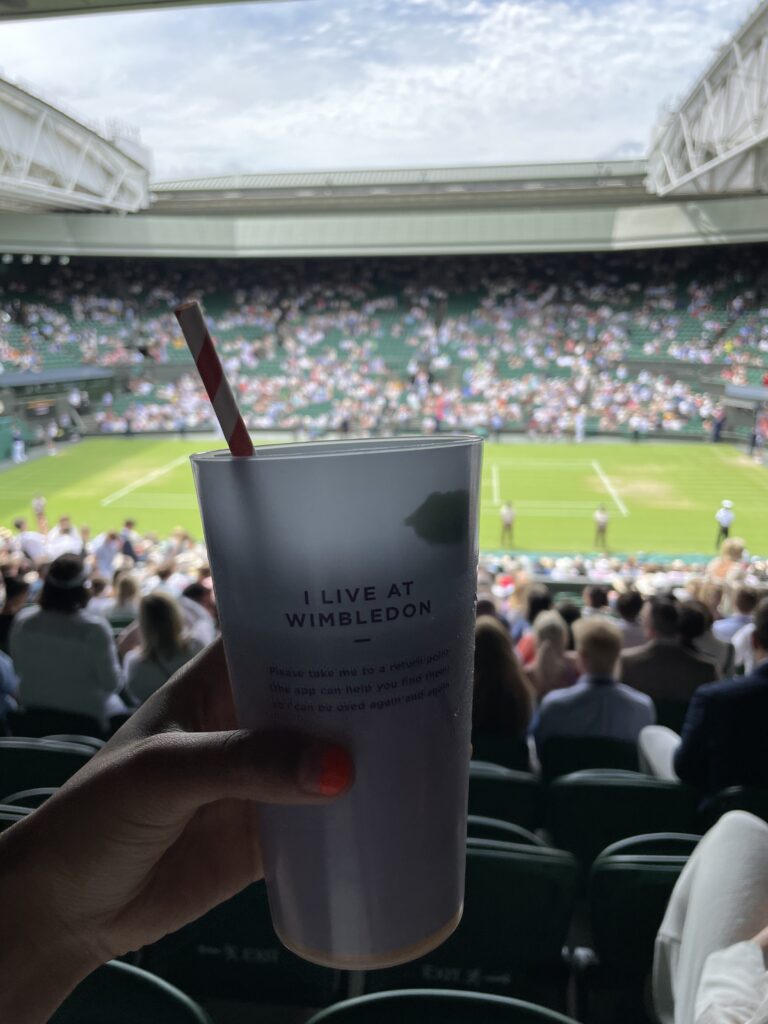 |
OVERHEARD |
“Strawberries in Pimm’s”: Fourth Round at Wimbledon

PHOTOGRAPH BY KRITHIKA VARAGUR.
Hangovers announced themselves on the wan faces on the District line to SW19 on the first Sunday of Wimbledon. Maybe I was projecting. It was a shame, people noted in low tones, that all the British players were now out. A pair of men splitting a salmon-colored broadsheet wondered which BBC presenter was at the center of a recent grooming scandal. “Last night was a proper, proper … if you saw the amount of tequila we were putting away,” said one handsome man, sitting between two heavily made-up girls. All of us filed out, in no particular rush, at Southfields. I went into Costa for an iced Americano before my friend arrived.
“Careful, dear,” tutted an elderly woman, gesturing to my wide-open tote, the only bag I had in London. “I have no spatial awareness at all,” I admitted, surveying some almonds, a packable quilted jacket, and a copy of Persuasion, all ripe for the picking. “It’s not a rough crowd, of course,” she said, adjusting a georgette shawl, that was the same pearl color as her fluffy hair. “These days, you just never know …” She trailed off. We’d realized, I think simultaneously, that we were in our first queue of the day at Wimbledon, which isn’t just the world’s oldest tennis tournament but a pageant of exuberant restraint, where orderly lines and enclosures have the quality of rites.
Louis arrived, wearing a gray wool suit, and we submitted ourselves to the flow of the crowd. A specter was haunting the weekend outfits—the specter of the Italian player Jannik Sinner’s huge Gucci duffel bag. Logomania was back, all around us: Goyard and Chanel bags, giant plastic Prada sunglasses, even several pairs of those Obama-era Tory Burch medallion flats. I complimented the sturdy unmarked sweater of a teacher from Somerset, who had, in recent years, become both a Wimbledon regular and a self-published author of over two dozen books on the pedagogy of drama. “I was actually going to wear my jumper printed with strawberries,” she said, “but we had a mishap with the dog this morning.”
At the corporate suite that housed our tickets, I asked a three-time seasonal employee if he’d ever encountered misbehavior at Wimbledon. Not really, he said. Had anyone ever, like, passed out? No. Had he ever heard an ambulance called? He jogged his memory for a moment, but also no. “I think,” he conjectured, “that people just sip on their drinks all day, but it’s a long day, so they end up absolutely fine.”
There was time to kill before the first match, which is why I found myself at the IBM Experience booth, contemplating its invitation to “raise the game with AI.” “Do you want to try it?” a ponytailed employee asked me. “Sure,” I said. She told me I could press a numbered button to replay clips from last year’s matches and commentate on a headset, just like they do on TV.
“Why?” I asked her. She smiled brightly.
“Who’s going to hear this?” I asked.
“It goes … into the system,” she said.
I asked her how AI improves tennis commentary.
“It helps us pick out the best parts of a match,” she said. “Really, it’s all on the website. Wimbledon dot com.”
I selected a clip from last year’s Kyrgios-Djokovic matchup. “Well,” I ventured, toward the end of my allotted thirty seconds, “it’s anyone’s game.” I later learned that I had done my part for their large language model.
The first Centre Court matchup that day was between the Russian Andrey Rublev (the world number seven) and the Kazakh Alexander Bublik (number twenty-six). “… like the most famous painter in Russia,” explained a man walking behind us, presumably about the Tarkovsky biopic indelibly evoked, in some quarters, by Rublev’s name. “Medieval Russia.” Our seats were halfway up the stands, facing the umpire. The court is smaller than you’d think; you can see puffs of white dust come loose when a ball hits a line with force. We watched the game mostly in pin-drop silence, but after exceptional shots or rallies, the crowd indulged in light cheering for “Sasha” and/or Andrey. (Wimbledon spectators’ sympathies lie less with underdogs than with whoever’s up at any given moment.) Last year, Russian and Belarussian players were banned from Wimbledon, but this year, only Russian and Belarussian flags and paraphernalia were.
They were still neck and neck when my phone vibrated with the alarm I’d set for afternoon tea. Back at the corporate suite, people were crowded around the television playing the Ashes, the Test cricket series between England and Australia. (The first-ever Wimbledon, in 1877, had a two-day break to avoid clashing with the Eton-Harrow cricket match.) England was poised to turn the tide by winning game three of five; they were two runs away, then one, and it was over: “That’ll do it,” “Oh thank God,” “That’s a relief.”
“I wish we could have been there,” said a dark-haired woman near me. “I mean, of course, this is great too,” she said, noting our current setting. What would she have done if she’d been invited to attend the Ashes and Wimbledon on the exact same day, I asked her. “Oh gosh, well, there’s just something about Headingley,” she said, of the Leeds suburb where that day’s match took place. I later learned that she was a professional cricket player with a Wikipedia page. “Do you think that Test cricket is on its last legs?” I asked Louis, recalling a long disquisition on the subject by my dad. “No chance,” said a short, besuited man with a Pimm’s Cup in each hand. “We don’t give up our traditions that easily, here in England.”
Two scones later, we were back in our seats to watch Rublev win in the fifth set. “They’re saying it’s one of the best-ever shots at Wimbledon,” said the man in the tall, well-dressed millennial couple next to me. He immediately pulled up a video replaying the penultimate point, which Rublev was describing, in a postgame interview happening below us, as “the most lucky shot ever.”
I set off to explore the grounds, which were part white-collar office park and part imperial palace gardens. The yellow-tile leaderboards showed that the Canadian player and occasional white rapper Denis Shapovalov had just been knocked out in a major upset. On court eight, two teen girls were duking it out during the hottest part of the day. A local tennis coach, leaning over a purple garbage can, explained that they mow the ryegrass courts to precisely eight millimeters every morning. But their famous “bounce,” he said, was critically endangered. “Used to be you’d see a lot of serve and volley, serve and volley,” when the balls would come fast and low. That “classic Wimbledon” gameplay has been displaced by longer rallies of the modern game. He had helped train some of the ball kids, whom I watched at close range, mesmerized by their identical striped polos, their whole heads turning left and right with each hit, and how they fed fresh balls, elbows unbent and arms extended at forty-five degrees. Like much else here, I felt that the Victorians would have loved these seen and unheard children.
Though the clouds had burned off and we were all crisping under direct sunlight, Wimbledon’s promise of perfect order seemed to hold: babies weren’t crying, couples weren’t fighting. I never saw anyone reach for sunscreen. I did find myself thinking more and more about one of my favorite videos, a Monty Python sketch where Wimbledon contestants are trounced by an anthropomorphic blancmange. I might, I realized, want another snack.
In yet another line, this one for strawberries and cream, a man from Bristol wearing performance sunglasses told me it had been just about twenty-four hours since he and his friends had set up tents in yesterday’s ticket queue. “Hardly roughing it,” he said, given the Deliveroo coverage, and even, if you were into that sort of thing, day passes to a gym near the campsite. (He wasn’t.) “There’s strawberries and cream, and then there are strawberries in Pimm’s,” a girl was explaining to her sister, by the row of cashiers. I thought about T. S. Eliot’s vaguely right-wing list of characteristic elements of English culture: “Derby Day, Henley Regatta, Cowes, the twelfth of August, a cup final, the dog races, the pin table, the dart board, Wensleydale cheese, boiled cabbage cut into sections, beetroot in vinegar, nineteenth-century Gothic churches and the music of Elgar.”
I stopped by the gift shop, where almost everyone looked like a potential employee, due to all the lanyards and commemorative gear. “Yellow! Yellow?” pleaded one mother, clutching an oversize novelty tennis ball—albeit a hot pink one—to a reedy blond man, until he admitted, finally, “I don’t work here.” I suspected there would be even better AC at the free tennis museum downstairs, where most of the other refugees were the parents of small children. At a “reaction station,” a father coached his two young daughters, in tulle dresses, toward excellence in a game that resembled whac-a-mole:
“Zoe! Mia. Mia! Come on. Zoe!”
She missed.
“No it’s fine. It’s fine.”
I sought out a to-go drink, a gin and tonic in a reusable plastic cup that said “I live at Wimbledon.” “Some people come here and don’t even watch the tennis,” said the bartender, a cherubic art student from the north of England. “They just sit here and make deals all day. But that’s more of a weekday crowd.”
We watched Iga Świątek play Belinda Bencic on Henman Hill, which had become very pleasant in the pink and orange part of the day. There were hours of tennis left, but the families clustered on blankets (and in one instance on a prayer rug) were already discussing routes home in minute detail. British people, noted Louis, are terrified of getting stuck somewhere. As for dinner, there were three options at the closest food court: BRITISH, GRILL, and WORLD. I chose WORLD.
“When did I last drink water?” a girl with bleached-blond hair asked her friends, around the tables where we all ate nondescript wraps standing up. “I think on the tube this morning. But then I had two espressos. Do you think that cancels it out?”
We took our seats one last time for the headliner, reigning world champion Novak Djokovic. The retractable roof, which was the futuristic white of a Calatrava bridge, shuttered over us. We also had some new rowmates, who were engaged in a conversation so animated that it visibly stressed out my British friend.
“But you are so American,” said a vivacious blond woman in her thirties, to the shy young man next to her. “No one could be more American than you.” He squirmed. “I learned English fourteen years ago, by watching old Hollywood movies,” she told him, in an implacable accent, as the first set progressed. The young professional nodded. “I used to live in Battersea, but I got a divorce. Now I live in Surrey. Do you know Surrey?” He did not. “But you must be a big deal,” she pressed, unleashing a dazzling smile on the timid young man. “Just a family friend who had tickets …” he offered, staring at the floor. “You are so cute,” she told him. “So charming, so bubbly.”
Hubert Hurkacz was making Djokovic fight for every point, and the first two sets both ended in tiebreaks. It was spectacular tennis, and then we had to go home. There’s an eleven o’clock curfew at Wimbledon, out of courtesy for neighbors, and it was already 10:35, though the match would keep going in our absence. (I watched Djokovic win the next afternoon, on my laptop.) We were shepherded into the mild night. The chatter converged on two topics: do you play tennis and we must play tennis. A group of four friends were resolving to change their lives. “I bet you’re really good.” “I’m dreadful.” “He’s dreadful.” “But I’ll start a group chat.” “It’s a shame not to. The weather’s been so good.” “We’ve got to play.” “We’ll play.”

Krithika Varagur is the author of The Call: Inside the Global Saudi Religious Project and an editor of The Drift.



No comments:
Post a Comment